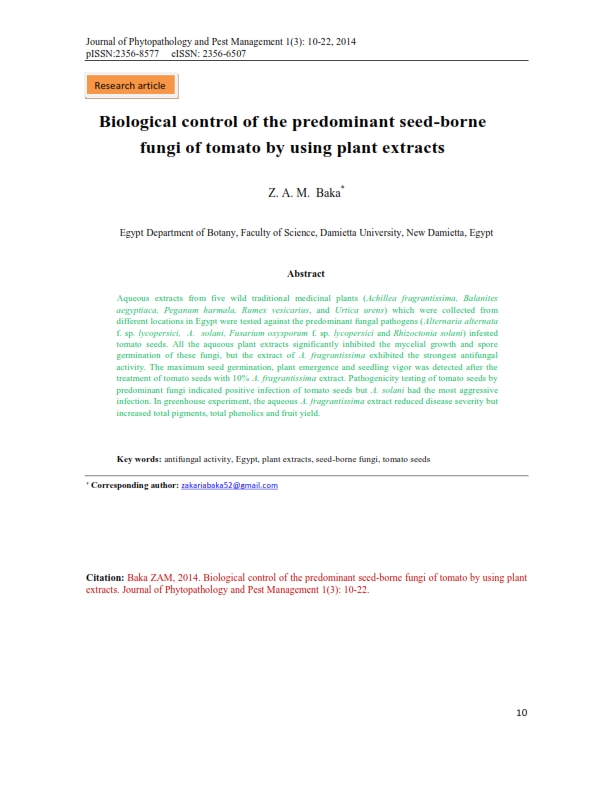Biological control of the predominant seed-borne fungi of tomato by using plant extracts
Schlagworte:
antifungal activity, Egypt, plant extracts, seed-borne fungi, tomato seedsAbstract
Aqueous extracts from five wild traditional medicinal plants (Achillea fragrantissima, Balanites aegyptiaca, Peganum harmala, Rumex vesicarius, and Urtica urens) which were collected from different locations in Egypt were tested against the predominant fungal pathogens (Alternaria alternata f. sp. lycopersici, Â A. Â solani, Fusarium oxysporum f. sp. lycopersici and Rhizoctonia solani) infested tomato seeds . All the aqueous plant extracts significantly inhibited the mycelial growth and spore germination of these fungi, but the extract of A. fragrantissima exhibited the strongest antifungal activity. The maximum seed germination, plant emergence and seedling vigor was detected after the treatment of tomato seeds with 10% A. fragrantissima extract. Pathogenicity testing of tomato seeds by predominant fungi indicated positive infection of tomato seeds but A. solani had the most aggressive infection. In greenhouse experiment, the aqueous A. fragrantissima extract reduced disease severity but increased total pigments, total phenolics and fruit yield.
Metriken

Downloads
Veröffentlicht
Zitationsvorschlag
Ausgabe
Rubrik
Lizenz
Authors who publish with Journal of Phytopathology and Disease Management agree to the following terms:
- Authors retain copyright and grant the journal right of first publication with the work simultaneously licensed under a Creative Commons Attribution License that allows others to share the work with an acknowledgement of the work's authorship and initial publication in this journal.
- Authors retain copyright and grant the journal right of first publication with the work simultaneously licensed under the Creative Commons Attribution-Non Commercial License (CC BY-NC). This allows others to share the work with an acknowledgement of the work's authorship and initial publication in this journal.
- Archives of Agricultural Sciences Journal is an Open Access Journal, and articles published are distributed under the terms of the Creative Commons Attribution-Non Commercial License (CC BY-NC). Readers may copy, distribute, and display the work for non commercial purposes with the proper citation of the original work. However, the journal retains the right to exploit subsidiary rights on behalf of the authors.
- Authors are able to enter into separate, additional contractural arrangements for the non-exclusive distribution of the journal's published version of the work (e.g. post it to an institutional repository or publish it in a book), with an acknowledgement of its initial publication in this journal.
- Authors are permitted and encouraged to post their work online (e.g., in institutional repositories or on their website) prior to and during the submission process with full disclosure to the journal, as it can lead to productive exchanges, as well as earlier and greater citation of published work. Following publication in Archives of Agricultural Sciences Journal, the author should update the repository, and include a citation and link to the published work.
Click here for more information on Licensing policy
.png)




